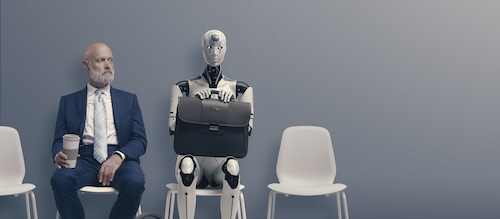Article summary
- You can be made redundant by your employer due to the implementation of AI, but only if they meet the criteria for redundancy
- One of the main criteria for redundancy is that there must be a ‘reduced requirement’ for the employee to carry out the work being replaced by AI
- Employers replacing staff with AI must show that this new method has reduced the need for employees in a specific role
- You may have a claim for unfair dismissal if your employer makes you redundant when they are not supposed to, or they do not follow the correct process
In principle, an employer can make an employee redundant if they have implemented AI technology to carry out the work they perform. However, in order to make you redundant through the implementation of AI, your employer must meet the legal criteria for redundancy. If they fail to meet these criteria, you may have a claim against your employer for unfair dismissal.
While an employer can make a person redundant due to AI, this does not mean that they ‘should’. According to a recent survey by Orgvue, around 39% of business leaders who have deployed AI in their firms have already made some staff members redundant as a result. And interestingly, 55% of those leaders think that they may have made the wrong decisions regarding those redundancies. Oliver Shaw, CEO of Orgvue, believes that businesses need to think long and hard before they decide to replace valued staff members with AI; “businesses are learning the hard way that replacing people with AI without fully understanding the impact on their workforce can go badly wrong. We’re facing the worst global skills shortage in a generation and dismissing employees without a clear plan for workforce transformation is reckless…Questions remain unanswered over whether artificial intelligence will yield enough return on investment in the near term to justify the costs associated with lost talent and downturn in productivity.”
In this article, we will summarise everything that you need to know about whether you can be made redundant by AI.
Can an employee be made redundant due to AI?
In principle, an employee can be made redundant by their employer as a result of AI being introduced to perform their role, but only if they meet the legal criteria for redundancy in accordance with the Employment Rights Act 1996 (ERA 1996). The ERA states that the dismissal of an employee will meet the criteria for redundancy if it is ‘wholly or mainly attributable to’ the employer:
- Ceasing or intending to cease to carry on the business for the purposes of which the employee was employed by it (business closure) (section 139(1)(a)(i), ERA 1996);
- Ceasing or intending to cease to carry on that business in the place where the employee was so employed (workplace closure) (section 139(1)(a)(ii), ERA 1996); or
- Having a reduced requirement for employees to carry out work of a particular kind or to do so at the place where the employee was employed to work (a reduced requirement for employees) (section 139(1)(b), ERA 1996).
It is this third criterion that employers may rely on to make an employee redundant due to AI.
Does the use of AI constitute a ‘reduced requirement’?
It is important to understand that the question of whether there is a reduced requirement is not the same as ‘Does the work still exist’? The criteria for redundancy will be met if the employer can demonstrate that they now genuinely require fewer employees, including as a result of AI efficiencies (e.g. AI automation). As such, it is not enough for the employer to simply adopt a new technology or working method (such as AI); they must show that this new method has reduced the need for employees in a specific role. This is the central question that employers must now come to terms with, and hence why seeking the advice of an Employment Law Solicitor is so important.
Can I make a claim for unfair dismissal if I have been made redundant due to AI?
You may have a claim for unfair dismissal if your employer did not follow the legal processes and requirements when making you redundant; this may be the case, for example, if your employer did not:
- Complete a consultation process if they intend to make 20 or more employees redundant over a period of 90 days or less
- Follow a fair process
- Pay you the correct amount of redundancy pay
- Evaluate your skills and qualifications with a view to placing you into another role within the business, or
- Consider any alternatives to redundancy.
Final words
If you have been dismissed or made redundant by your employer as a result of AI, please speak to a member of our Employment Law team who can recommend the best course of action. We will assess your case to determine if there are grounds for a claim. Likewise, if you have just been made aware of the potential of being made redundant due to AI, our team can advise you on your rights and deal with your employer.
To instruct one of our Employment Law Solicitors, please fill in our contact form or email us at [email protected]
